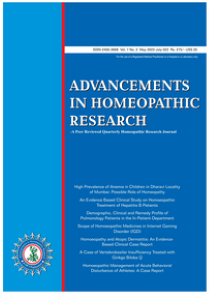Evaluating the Efficacy and Safety Profile of Good Morning™ Constipation Drops in a Loperamide-Induced Rat Model
DOI:
https://doi.org/10.48165/ahr.2023.8.4.1Keywords:
Safety Profile, Good Morning™, Loperamide-Induced, RatAbstract
Introduction: Constipation is a prevalent gastrointestinal condition globally, often managed with conventional laxatives that may cause side effects and dependency. Homeopathy, offering a holistic approach through diluted natural substances, aims to stimulate the body's self-healing mechanism. This study evaluates Good Morning™ drops, an innovative homeopathic formulation designed to safely and effectively manage constipation. Using a rat model of Loperamide-induced constipation, we evaluated its safety and efficacy, unveiling promising results.Materials and Methods: A rat model of Loperamide induced constipation was utilized to assess the efficacy and safety of Good Morning™ Constipation Drops. 3 unique formulations were prepared and employed to the animal model in 3 different doses. 72 rats were randomly assigned to 12 groups (3 control groups plus 3 formulations in 3 different doses totalling 9 groups), receiving specific variants or control treatments over the period of 21 days. Parameters including body weight, water intake, stool count, intestinal function, haematology, bleeding and clotting time, blood biochemistry, and organ weight were evaluated. Results and discussion: The results showed that all homeopathic formulations, particularly Variant 2, exhibited significant effects in Loperamide induced constipated rats. Across various parameters, Variant 2 consistently influenced food intake, stool characteristics, and small intestine motility. Safety assessments indicated overall well-being, withVariant 2 demonstrating superior survival outcomes. These findings position Variant 2 as a promising candidate for constipation management, emphasizing its consistent efficacy and safety in the rat model. Conclusion: In conclusion, Good Morning™ Constipation Drops exhibited a promising blend of safety, efficacy, and a multifaceted mechanism of action. The formulation, rich in botanical ingredients, demonstrates high safety with favorable survival rates. Efficacy is evident in improved stool counts, stool weights, Small Intestine Transition percentages, and impacts on lipid profiles and liver enzymes, highlighting its potential as a comprehensive solution for constipation relief.
References
Agrawal, A., Whorwell, P. J. (2017). Constipation in adult patients: diagnosis and management. British Medical Journal, 357, j2041. doi: 10.1136/bmj.j2041
Suares NC, Ford AC. Systematic review: the effects of fibre in the management of chronic idiopathic constipation. Alimentary Pharmacology & Therapeutics. 2011;33(8):895-901. doi:10.1111/ j.1365-2036.2011.04594.x
Lee, M. Y., Shin, M. S., Choi, S. M., Kim, S. K. (2014). Effects of Physical Exercise on Oxidative Stress, Serotonin, and Proliferating Cell Nuclear Antigen Expression in the Brain of a Rat Model of Chronic Constipation. Journal of Exercise Rehabilitation, 10(2), 77-84. doi: 10.12965/jer.140110
Pittler, M. H., Ernst, E. (2010). Homeopathy for chronic constipation: a systematic review of randomized controlled trials. Gastroenterology Research and Practice, 2011, 938763. doi: 10.1155/2011/938763
Sreedharan, S., Misra, S., Iyer, D. (2019). Gut Brain Axis: Challenges in Understanding the Gut Microbiota's Role in the Brain's Functioning. Journal of Neurogastroenterology and Motility, 25(1), 1-3. doi: 10.5056/jnm18180
Müller-Lissner S. Side effects of laxatives. Zeitschrift fur Gastroenterologie. 1992 Jun 1;30(6):418-27.
Xing JH, Soffer EE. Adverse effects of laxatives. Diseases of the colon & rectum. 2001 Aug;44:1201- 9.
Wyld, D., & Petkov, J. (2015). The potential and risks of natural compounds in treating constipation. European Journal of Clinical Nutrition, 69(11), 1201-1208. doi: 10.1038/ejcn.2015.94
Nakhooda, Farhana. The efficacy of individualised homeopathic treatment on constipation. University of Johannesburg (South Africa), 2016.
Mallick PS, Chakrabarty T. Constipation and Homoeopathic Cure. Journal of Medical and Pharmaceutical Innovation. 2021 Sep 27;8(43s).
W. H. Burt, Physiological Materia Medica, B. Jain Publishers, New Delhi.
R. Murphy, Lotus Materia Medica, Third Revised Edition, B. Jain Publishers, New Delhi.
A. L. Blackwood, A Manual of Materia Medica, Therapeutics and Pharmacology, Reprint Edition 1995, B. Jain Publishers, New Delhi.
W. Boericke, New Manual of Homoeopathic Materia Medica & Repertory [with Relationship of Remedies], Second Re-Augmented & Revised Edition Based on Ninth Edition, Reprint Edition 2002, B. Jain Publishers, New Delhi.




